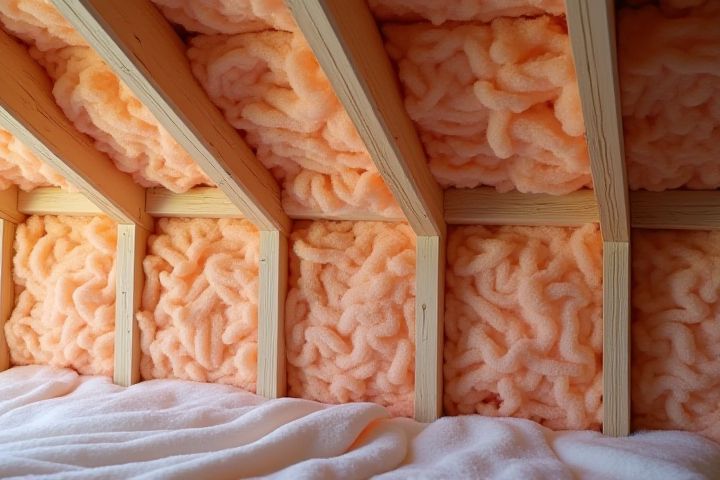
House insulation plays a crucial role in energy efficiency by minimizing heat transfer between the interior and exterior, ultimately reducing energy costs. Proper insulation enhances comfort levels by maintaining a stable indoor temperature, preventing drafts in winter and excessive heat in summer. It also contributes to improved air quality by reducing moisture buildup and preventing mold growth within the home. Investing in quality insulation materials, such as fiberglass, foam board, or spray foam, can lead to significant savings on heating and cooling bills over time. By ensuring your home is well-insulated, you not only protect your investment but also contribute to a more sustainable environment.
Why House Insulation Is Important
Energy Efficiency
House insulation significantly enhances energy efficiency by minimizing heat transfer, which directly reduces heating and cooling costs. Proper insulation can cut energy bills by up to 20% annually, translating to savings of hundreds of dollars each year. According to the U.S. Department of Energy, well-insulated homes can achieve energy savings equivalent to reducing carbon emissions by nearly 1,000 pounds per year. By investing in quality insulation, you not only enhance your comfort but also contribute to a sustainable environment by lowering overall energy consumption.
Thermal Comfort
Proper house insulation significantly enhances thermal comfort by maintaining a consistent indoor temperature regardless of external weather conditions. In homes with well-insulated walls, roofs, and floors, energy consumption can be reduced by up to 30%, leading to lower heating and cooling bills. This not only contributes to a more comfortable living environment but also helps in reducing your carbon footprint. According to studies, homes with optimal insulation can experience up to a 50% reduction in drafts and temperature fluctuations, ensuring a cozy atmosphere throughout the year.
Reduced Utility Bills
Effective house insulation significantly reduces utility bills by minimizing heat loss during winter and heat gain in summer, leading to improved energy efficiency. Studies indicate that properly insulated homes can save homeowners up to 20% on heating and cooling costs annually. By maintaining a consistent indoor temperature, you rely less on heating and air conditioning systems, which results in lower energy consumption. Over time, these savings not only offset the initial investment in insulation but also contribute to a more sustainable household.
Environmental Impact
House insulation plays a crucial role in reducing energy consumption and lowering greenhouse gas emissions. By minimizing heat loss during winter and heat gain during summer, effective insulation decreases the reliance on heating and cooling systems, resulting in fewer fossil fuel emissions. This not only lessens your home's carbon footprint but also contributes to decreased demand for energy production, which is often sourced from non-renewable resources. Investing in quality insulation can significantly improve indoor air quality and overall environmental sustainability, promoting a healthier planet for future generations.
Noise Reduction
House insulation plays a crucial role in noise reduction, creating a more tranquil living environment. Effective insulation materials can significantly decrease sound transmission, reducing up to 80% of unwanted noise from outside or between rooms. For example, fiberglass or foam insulation helps absorb sound waves, making them ideal for homes located in busy urban areas or near highways. By investing in proper insulation, you can enhance your comfort level and improve the overall quality of life in your home.
Moisture Control
House insulation plays a critical role in moisture control, preventing condensation that can lead to mold growth and structural damage. Proper insulation helps maintain a consistent indoor temperature, reducing the likelihood of warm, moist air meeting cold surfaces, which creates conditions for moisture accumulation. Studies show that homes with effective insulation can decrease moisture-related problems by up to 50%, enhancing overall air quality. By ensuring that your home is well-insulated, you protect not just the building's integrity but also the health of its occupants.
Increased Property Value
House insulation significantly enhances your property value by improving energy efficiency, which is an attractive feature for potential buyers. Homes with proper insulation can save up to 20% on heating and cooling costs, leading to lower utility bills and increased comfort. In regions with extreme temperatures, well-insulated homes can retain heat in winter and keep cool in summer, making them more desirable in the real estate market. Investing in insulation can lead to a return of up to 107% on initial costs, making it a smart financial decision when looking to increase your home's market appeal.
Improved Indoor Air Quality
House insulation plays a crucial role in enhancing indoor air quality by minimizing the infiltration of outdoor pollutants and allergens. Proper insulation prevents drafts, reducing the need for heating and cooling systems, which can circulate dust and other contaminants. A well-insulated home maintains stable temperatures, supporting more efficient humidity control and mitigating mold growth. By investing in quality insulation, you can significantly improve your living environment, ensuring cleaner and healthier air for you and your family.
Enhanced Durability of Building
House insulation significantly contributes to the enhanced durability of a building by minimizing temperature fluctuations and moisture intrusion, which can lead to structural damage over time. Insulated walls and roofs maintain a stable indoor climate, reducing stress on materials and preventing issues such as mold growth, rot, and material degradation. By investing in quality insulation, you can decrease the need for repairs and prolong the lifespan of your home, potentially saving you thousands of dollars in maintenance costs. Statistics indicate that proper insulation can extend the life of your roofing system by 30% or more, underscoring its importance in protecting your investment.
Seasonal Versatility
House insulation is crucial for maintaining a stable indoor climate across all seasons, ensuring comfort whether it's the heat of summer or the chill of winter. Proper insulation can reduce heating and cooling costs by up to 30%, translating to significant savings over time. In cold months, it prevents heat loss, while in warm months, it blocks external heat, helping to reduce reliance on HVAC systems. Investing in quality insulation not only enhances energy efficiency but also improves your home's overall value and livability.
